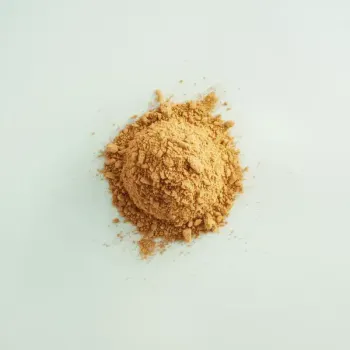Onion Powder and Salt are essential seasonings in cooking. Onion Powder provides a sweet and savory flavor, while Salt enhances other ingredient flavors. They differ in texture, origin, and usage across various dishes like dry rubs, soups, marinades, and baked goods.

Onion powder is a seasoning made from dehydrated ground onions, offering a concentrated flavor that's both sweet and savory. It's a versatile ingredient that provides the essence of onion without the moisture.

Salt, known scientifically as sodium chloride, is a mineral essential for life. It's used in cooking to enhance the natural flavors of ingredients and is valued for its ability to preserve food.
Onion powder brings a depth of flavor, contributing sweetness and a mild onion tang, while salt is primarily a flavor enhancer that makes other ingredients taste more themselves. Texture-wise, onion powder is fine and powdery, whereas salt can come in various granule sizes. Onion powder is made from onions, whereas salt is harvested from salt mines or seawater.

Your ultimate Recipe Box, Meal Planner, and Cooking Class all in one
In a dry rub, onion powder can be used to create a nuanced taste profile, adding a hint of onion flavor that complements meats like chicken, pork, and beef without overwhelming the palate. Salt in a dry rub is essential for seasoning the meat and drawing out moisture, which helps to form a crisp outer crust during cooking. It's a foundational ingredient in rubs for all types of meat.
Onion powder can be used in soups and stews to add a quick and easy onion flavor, especially when fresh onions aren't available. It dissolves well and integrates seamlessly into the liquid. Salt is critical in soups and stews for balancing and enhancing the flavors of all the ingredients. It's important to add it gradually and taste often to avoid oversalting.
Onion powder works well in marinades, providing flavor without the need for fresh onions, which can sometimes be too overpowering or require extra preparation time. Salt in marinades acts as a brine, tenderizing the meat and ensuring flavor is carried deep into the fibers. It's a critical component for any marinade recipe.
Onion powder can be an unexpected yet delightful addition to savory baked goods like breads, biscuits, and crackers, offering a subtle flavor twist. Salt in baked goods isn't just about flavor; it also affects the structure and browning of the final product, making it an indispensable ingredient in both savory and sweet baking.
Onion powder offers a small amount of nutrients from dehydrated onions, while salt is not a significant source of any nutrients except for sodium.
| Nutrient | Salt ( per Teaspoon ) | Onion Powder ( per Teaspoon ) |
|---|---|---|
| Fat | 0g | 0.02g |
| Sodium | 2325mg | 2mg |
| Calcium | 0mg | 5mg |
| Protein | 0g | 0.24g |
| Calories | 0 | 8 |
| Carbohydrates | 0g | 1.94g |
Onion powder cannot replace the flavor-enhancing properties of salt, but it can introduce a savory element to dishes when salt is limited.
The choice between onion powder and fresh onions depends on the desired flavor intensity, texture, and preparation time. Onion powder offers convenience and a milder taste, while fresh onions provide a more potent flavor and texture.
Approximately one tablespoon of onion powder can substitute for one medium-sized onion in recipes where texture isn't critical.
While salt is primarily known for its salty taste, different types can have subtle flavor notes, such as minerality in sea salt or a slight sweetness in some rock salts.
Onion powder is less nutritious than fresh onions due to the dehydration process, but it's still a healthy option when used in moderation.